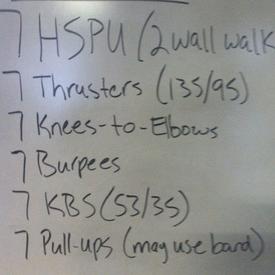Food Label Lies - you won't FREAKING Believe this!
Replies
-
I have known that for sometime now.
Here is another eye opener for you.about why you should use a scale when measuring calorie dense foods. http://www.youtube.com/watch?v=JVjWPclrWVY
http://www.youtube.com/watch?v=JVjWPclrWVY
But on the other hand (I'm playing devil's advocate here):
Human beings have gotten along for millions of years without measuring everything exactly and concurrently without being overweight....because our bodies tell us what we need, on what days we need more food, on what days we need less food (to balance out the days we had too much), etc. So, while yes, this video certainly proves a point, unless a person is absolutely consistently measuring wrong (and never just doing what feels right for a particular day/meal - i.e. naturally balancing the diet), the video won't necessarily hold true.
Just saying. Not trying to debate. Peace.
You are actually very correct. It is not about the # of calories we consume, but the nutritional value of the food we eat. The more nutrient dense the food is - the less we will eat and our body will be satisfied with no cravings.
Even Weight Watchers is now owning up to the fact that it is not about the # of calories consumed. Weight loss and health is not as simple as the mathetical equation they try to make it out to be. Has nothing to do with calories period.
Read this article.............
http://articles.mercola.com/sites/articles/archive/2011/03/09/weight-watchers-finally-recognizes-calorie-counting-doesnt-work.aspx
We need to listen to our bodies!!!0 -
I have known that for sometime now.
Here is another eye opener for you.about why you should use a scale when measuring calorie dense foods. http://www.youtube.com/watch?v=JVjWPclrWVY
http://www.youtube.com/watch?v=JVjWPclrWVY
GUILTY!! :frown:0 -
bump0
-
BUMP0
-
Wow, this is kind of crazy. 20% seems like a huge margin for error! And restaurant food too; I've always thought their online/publicized calorie counts were probably nowhere near correct. Anyway, just bumping so I can check out the links tomorrow.0
-
So true. I tell my clients this all the time. And those of you who know me, know how big of an advocate I am of weighing food, rather than measuring it by volume (measuring cups).
Remember that this 20% margin is COMMON especially in frozen prepared meals (e.g., Lean Cuisine, etc.) and meals from restaurants (often higher than 20%). Most trainers propose the rule of thumb that if folks eat these products much, to add 20% to their calorie count just to be safe (e.g, 180 calories on the label is 180 *1.2 = 216). A side benefit is that when folks have to do this often, they frequently get tired of the caloric 'rip offs' and start moving toward unprocessed foods that they make themselves (and that's something we trainers like to see!).0 -
"One example, billed as a "carob coated" doughnut with three grams of fat and 135 calories, actually was a chocolate doughnut that contained 18 grams of fat and 530 calories. "
Holy crap! Eat one of those a day thinking you're doing okay and your killing your progress. :mad: :sick:0 -
That's why I use a food scale to weigh mine. I don't assume each apple or orange will be the same amount of cals, it's worth it to me to check for accuracy.but whole foods are going to vary too, right? I don't weigh the apples I eat but they vary a lot in size but I enter them as generic apple for 100 cals and that could be very different. presumably other fruits might vary in their sweetness and calorie content, even if the weight was the same.
This is not to justify what Galeo salad dressing did, I just realize that not every food, packaged or whole, is going to be consistent.0 -
And if this is what's happening with packaged food, just imagine in a restaurant where they are cooking things fresh. An extra pat of butter or fattier cut of meat and you're eating way more than you think :frown:
I'm not going to lie; I work at Papa John's (I know, why am I here? I'm destined to be fat!!). If we have a product that is perfectly useable, but nearing expiration, we "push" the product- i.e. if tomatoes expire in 1 day, we'll throw some extra on every pizza that calls for tomatoes. That is just the very least of it: training pizza makers tend to over-top pizzas (I saw a kid try to throw three cups of cheese on a pizza that called for 1 1/2 cups one time at my old pizza place), and even seasoned guys think that they know best. Humans are subject to error, and as long as humans make your food, there will be error. I myself admit to throwing a handful of cheese on a pizza so it covers all the sauce, etc. Papa John's has nutritional information available online based on very specific cup measurements for all toppings, but I promise, it still happens every day. :ohwell:0 -
It's why I started making everything myself, including baking my own bread. That and because I get so much better food for less money. If I watch my food intake, I want to be sure that what I eat is within my span of control as much as possible, and tastes delicious.0
-
Bump for later. Thanks0
-
And to follow-up on what I said before, that video also assumes that we are calculating our calorie *burn* 100% accurately, 100% of the time. How do we know that each HRM is not a little different than the nex, that it's not missing a heartbeat every so often because of our bodily movements, that all the burn calculators we find online are accurate enough, etc. Also, how do we really, truly know that the nutritional numbers that we have been relying on for all these years for, for example, pure raw oatmeal or chicken breast by the gram, aren't also 5% off? How do we know that the lab who measured that in the first place didn't make a small mistake or miscalculation, or that their scientific method could or couldn't have been better? Who can say that every single solitary 100 grams of raw chicken breast *always* has precisely 110 calories? Maybe that chicken over there has 115 calories and that other one next to it has 105 calories, due to goodness knows what contributing factors. How do we know for sure that the batch of tomatoes we bought today weren't grown in different soil, with different fertilizer and a different amount of water and sun than the previous crop, thus making them 10-15% different nutrition-wise than the last batch we bought? How do we know that the calories per gram of raw apples doesn't change even minutely from harvest to harvest, based on any number of factors like these listed above?
We simply can't. And we shouldn't worry of such small things.
All I am saying is that nothing is 100% accurate. While this certainly doesn't give manufacturers leeway to lie, or even leeway for them to make mistakes of a certain degree given informtion (correct or not) that we are all universally using -- and all that definitely speaks to the reasons why whole foods are better than anything packaged, processed or premade -- I think that for us to try to control everything with regard to those whole foods all the time to a perfect level of exactness, will only drive ourselves crazy. The human body is a magical machine, and as long as we are not abusing it constantly, or overeating all the time, or starving it too much/too regularly, it always adjusts for these small variations and keeps itself in check.
Don't strress, people; just do what you know is good for you and it will all work out in the end.0 -
So true. I tell my clients this all the time. And those of you who know me, know how big of an advocate I am of weighing food, rather than measuring it by volume (measuring cups).
Remember that this 20% margin is COMMON especially in frozen prepared meals (e.g., Lean Cuisine, etc.) and meals from restaurants (often higher than 20%). Most trainers propose the rule of thumb that if folks eat these products much, to add 20% to their calorie count just to be safe (e.g, 180 calories on the label is 180 *1.2 = 216). A side benefit is that when folks have to do this often, they frequently get tired of the caloric 'rip offs' and start moving toward unprocessed foods that they make themselves (and that's something we trainers like to see!).
There was a big news thing about frozen meals 6 months or so ago. The frozen diet meals were way off.0 -
0
-
The human body is a magical machine, and as long as we are not abusing it constantly, or overeating all the time, or starving it too much/too regularly, it always adjusts for these small variations and keeps itself in check.
And this is why our weight fluctuates, throughout a day, day to day, week to week, even month to month. I feel that as long as we stay within a given range of weight/fitness, then we should be pleased, satisfied and happy. 0
0 -
WOW! Fantastic post...Thank you for posting!0
-
Case in point. I bought Red Mill Oat Bran a couple of months ago. Calories 80 per serving......just bought a new package and now the calorie count is 120 per serving. WTH? Same serving size and nothing in the ingrediants has changed. GRRR0
-
And if this is what's happening with packaged food, just imagine in a restaurant where they are cooking things fresh. An extra pat of butter or fattier cut of meat and you're eating way more than you think :frown:
I'm not going to lie; I work at Papa John's (I know, why am I here? I'm destined to be fat!!).
I'll see your Papa Johns and raise you a vegan McDonalds worker.;p
Do you get free meals every shift too? Every single one of my coworkers - including me - put on at least ten pounds in the first month or so from that. I stopped eating them a few months back, except for the odd salad when I cba to pack a lunch in the morning.
One thing about McDs fries; the packets are supposed to be half empty. There's a certain technique to filling them so all the fries stay straight up, and the packet doesn't pop open fully.
Once, a manager spent a day carefully measuring flurries on a scale; they were consistently over the required amount. There's a trick to that too, making it look full, but actually be half empty.
Then there's the simple fact that, when McDs first opened, a basic meal was a hamburger, fries, and a drink, and the fries and drink were what we now call 'small' (kiddie in the US?). That's a kid's meal now, and it's plenty of food for an adult.0 -
Case in point. I bought Red Mill Oat Bran a couple of months ago. Calories 80 per serving......just bought a new package and now the calorie count is 120 per serving. WTH? Same serving size and nothing in the ingrediants has changed. GRRR
I noticed the same thing with Lactaid Skim Milk....it used to say 80 calories per cup, now it says 90....and this is just plain milk, basically a whole food....hence my point about a possibly flawed scientific method or things chancing from crop to crop, harvest to harvest, and in this case cow to cow I guess.0 -
I'll see your Papa Johns and raise you a vegan McDonalds worker.;p
Do you get free meals every shift too? Every single one of my coworkers - including me - put on at least ten pounds in the first month or so from that. I stopped eating them a few months back, except for the odd salad when I cba to pack a lunch in the morning.
One thing about McDs fries; the packets are supposed to be half empty. There's a certain technique to filling them so all the fries stay straight up, and the packet doesn't pop open fully.
Once, a manager spent a day carefully measuring flurries on a scale; they were consistently over the required amount. There's a trick to that too, making it look full, but actually be half empty.
Then there's the simple fact that, when McDs first opened, a basic meal was a hamburger, fries, and a drink, and the fries and drink were what we now call 'small' (kiddie in the US?). That's a kid's meal now, and it's plenty of food for an adult.
Oh dear, let's not get started on Mickey D;'s. We could write encyclopdeias about them! Lol.0 -
U wanna talk about something crazy..my trainer used to work for applebees.. The vinaigrette dressing that they use for their healthy salads etc is left over chicken fat and sugar. That totally grossed me out!! Oh and the appetizer sampler not counting the ranch everyone uses is 2500 calories alone...add some ranch and you are at 3000 for an appetizer....OUCH!0
-
I have known that for sometime now.
Here is another eye opener for you.about why you should use a scale when measuring calorie dense foods. http://www.youtube.com/watch?v=JVjWPclrWVY
http://www.youtube.com/watch?v=JVjWPclrWVY
But on the other hand (I'm playing devil's advocate here):
Human beings have gotten along for millions of years without measuring everything exactly and concurrently without being overweight....because our bodies tell us what we need, on what days we need more food, on what days we need less food (to balance out the days we had too much), etc. So, while yes, this video certainly proves a point, unless a person is absolutely consistently measuring wrong (and never just doing what feels right for a particular day/meal - i.e. naturally balancing the diet), the video won't necessarily hold true.
Just saying. Not trying to debate. Peace.
You are actually very correct. It is not about the # of calories we consume, but the nutritional value of the food we eat. The more nutrient dense the food is - the less we will eat and our body will be satisfied with no cravings.
Even Weight Watchers is now owning up to the fact that it is not about the # of calories consumed. Weight loss and health is not as simple as the mathetical equation they try to make it out to be. Has nothing to do with calories period.
Read this article.............
http://articles.mercola.com/sites/articles/archive/2011/03/09/weight-watchers-finally-recognizes-calorie-counting-doesnt-work.aspx
We need to listen to our bodies!!!
I often say it's simple math, but it's not that simple.
I agree with your points. There are so many things that have contributed to the rising obesity epidemic in this country. And the quality of food that we get is certainly a big piece of the puzzle. I also often say that not all calories are created equal. Measuring everything is a relatively "new" phenomenon. But thousands of years ago we scavenged for our food and often went hungry: we were true locavores with very little choice about what to eat. You ate what you found. Then a little over 100 years ago we really began that shift from an agrarian society to an industrial one. Up until about 60 years ago we walked or rode bikes everywhere and still made, and probably even grew, a lot of our own food. Milk and cheese were straight from the dairy and bread from a bakery. And we didn't have the overwhelming assortment of Frankenfoods on the shelves. And there you have it....extreme changes in diet and exercise...that really only goes back about 50 years.
I think the weighing comes in handy because we have a very skewed idea of what a "serving" is. My first 30# just fell off when I pulled out the measuring cups. I was eating healthy, but I was still eating too much. I have moved to using a scale as the loss has stopped: I don't eat a lot of processed foods as it is, so that was my next step.0 -
I suppose this is another reason why I must be losing weight when I don't eat 100% of my allowed calories. Between the 20% labels problem and the 30% exaggerated calorie burns on those cardio machines it is no wonder I never lost weight with when I thought I should have.0
This discussion has been closed.
Categories
- All Categories
- 1.4M Health, Wellness and Goals
- 397.1K Introduce Yourself
- 44.2K Getting Started
- 260.9K Health and Weight Loss
- 176.3K Food and Nutrition
- 47.6K Recipes
- 232.8K Fitness and Exercise
- 456 Sleep, Mindfulness and Overall Wellness
- 6.5K Goal: Maintaining Weight
- 8.7K Goal: Gaining Weight and Body Building
- 153.4K Motivation and Support
- 8.3K Challenges
- 1.3K Debate Club
- 96.5K Chit-Chat
- 2.6K Fun and Games
- 4.6K MyFitnessPal Information
- 16 News and Announcements
- 18 MyFitnessPal Academy
- 1.4K Feature Suggestions and Ideas
- 3.1K MyFitnessPal Tech Support Questions













